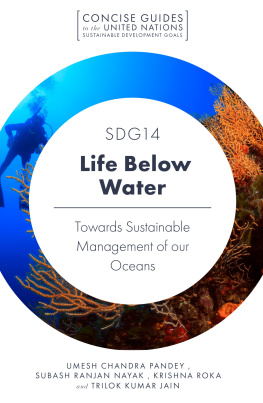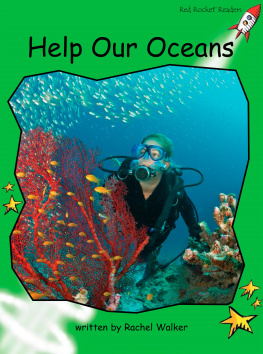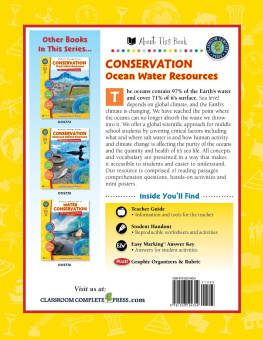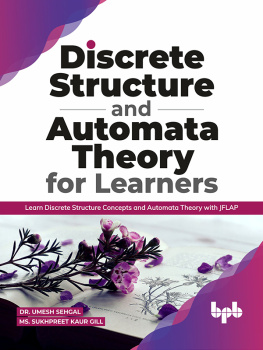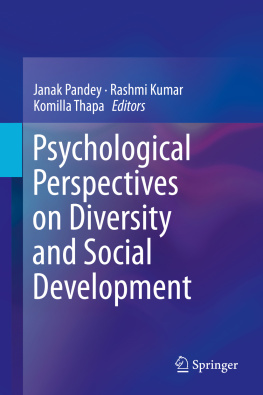SDG14 LIFE BELOW WATER
CONCISE GUIDES TO THE UNITED NATIONS SUSTAINABLE DEVELOPMENT GOALS
Series Editors
Walter Leal Filho
World Sustainable Development Research and Transfer Centre, Hamburg University of Applied Sciences, Germany
Mark Mifsud
Centre for Environmental Education and Research, University of Malta, Malta
This series comprises 17 short books, each examining one of the UN Sustainable Development Goals (SDGs).
The series provides an integrated assessment of the SDGs from an economic, social, environmental and cultural perspective. Books in the series critically analyse and assess the SDGs from a multi-disciplinary and a multi-regional standpoint, with each title demonstrating innovation in theoretical and empirical analysis, methodology and application of the SDG concerned.
Titles in this series have a particular focus on the means to implement the SDGs, and each one includes a short introduction to the SDG in question along with a synopsis of their implications on the economic, social, environmental and cultural domains.
SDG14 LIFE BELOW WATER
Towards Sustainable Management of Our Oceans
BY
UMESH CHANDRA PANDEY
Indira Gandhi National Open University, India
SUBASH RANJAN NAYAK
Indira Gandhi National Open University, India
KRISHNA ROKA
Winona State University, USA
TRILOK KUMAR JAIN
Manipal University Jaipur, India
United Kingdom North America Japan India
Malaysia China
Emerald Publishing Limited
Howard House, Wagon Lane, Bingley BD16 1WA, UK
First edition 2021
2021 Umesh Chandra Pandey, Subash Ranjan Nayak, Krishna Roka and Trilok Kumar Jain. Published under exclusive licence by Emerald Publishing Limited.
Reprints and permissions service
Contact:
No part of this book may be reproduced, stored in a retrieval system, transmitted in any form or by any means electronic, mechanical, photocopying, recording or otherwise without either the prior written permission of the publisher or a licence permitting restricted copying issued in the UK by The Copyright Licensing Agency and in the USA by The Copyright Clearance Center. No responsibility is accepted for the accuracy of information contained in the text, illustrations or advertisements. The opinions expressed in these chapters are not necessarily those of the Author or the publisher.
British Library Cataloguing in Publication Data
A catalogue record for this book is available from the British Library
ISBN: 978-1-80043-651-0 (Print)
ISBN: 978-1-80071-709-1 (Online)
ISBN: 978-1-80071-711-4 (Epub)
CONTENTS
ABOUT THE AUTHORS
Umesh Chandra Pandey holds an M.Phil. in Environmental Science and Ph.D. in Physics. Presently, he works as Regional Director of Indira Gandhi National Open University (IGNOU) at Bhopal (India). During nearly three decades of professional career, he has performed several academic and administrative responsibilities in IGNOU where he joined initially as Lecturer in Physics in 1990 and subsequently rose to the level of Dy Director and Regional Director. He also worked as Director (Knowledge Management) in School of Good Governance and Policy Analysis (Bhopal, India), where he significantly contributed for the identification, compilation and dissemination of best practices in governance. His current research interests include the open and distance learning and sustainable development.
Subash Ranjan Nayak is presently working as Assistant Regional Director of Indira Gandhi National Open University (India). He did his M.Phil. and Ph.D. in Environmental Movements in the context of development from Jawaharlal Nehru University (India). His major areas of interest are social movements, sustainable development and open and distance learning.
Krishna Roka is an Assistant Professor of Sociology at Winona State University, USA. He obtained his Ph.D. from the Pennsylvania State University and his research interests include urbanisation, sustainable development, environment and society, climate change and inequality.
Trilok Kumar Jain is a Professor in Manipal University Jaipur. His research areas include social entrepreneurship, social innovation and sustainable development.
PREFACE
Oceans constitute about three-quarters of the earths surface; they contain 97% of the earths water and represent 99% of the living space of the planet by volume. However, about 95% of the ocean is still unexplored, around 91% of oceanic species are yet to be classified and large numbers of fish species (1,851 species as reported in 2010) are at risk of extinction. Even though human beings largely inhabit land, they have a significant dependence on oceans.
The oceanic processes and their biodiversity make the earth habitable, as they contribute many ecosystem services (CBD, 1992; Convention on Biological Diversity, n.d.). In addition, coastal and marine resources contribute US$28 trillion to the global economy every year. Importantly, oceans absorb about 40% of the carbon dioxide produced by human beings, thereby moderating the impact of global warming. They are the worlds largest sources of protein, with a large proportion of the human population (over 3 billion) depending upon them as their primary source of protein. The estimated market value of such marine and coastal resources and industries is about US$3 trillion per year, which amounts to 5% of global gross domestic product (UN Web Site, n.d.-a).
So far, we know little about the importance of oceans to humans and other land species. Oceanic temperature, chemistry, currents and life regulate global systems and processes which ensure the availability of rainwater, drinking water and oxygen. Human interventions, such as pollution, depleted fisheries and loss of coastal habitats, are adversely affecting the sustainability of oceanic life. About 40% of the worlds oceans are already heavily affected by such activities (UN Web Site, n.d.-a). Unmonitored fishing is also causing ocean fisheries to generate US$50 billion less per year than they could. Hence, there is increasing realisation that protecting our oceans and the lives that depend on them is a global responsibility. The global community has now committed to achieving the sustainable management of marine ecosystems by 2020 and, in a further five years, to significantly reduce marine pollution of all kinds. The Sustainable Development Goals (SDGs) of the United Nations have viewed these issues from a very broad perspective. It is clear that we need an international scientific partnership, regulation of harvesting and fishing and enhancement of our research and knowledge on issues critical to the survival of life underwater. In the context of the SDGs, the following issues need immediate attention:
(a) How does human life on earth depend on oceanic processes and biodiversity?
(b) How is marine life under threat from pollution of various kinds?
(c) What are the repercussions of the threat to oceanic life for sustainable development?

